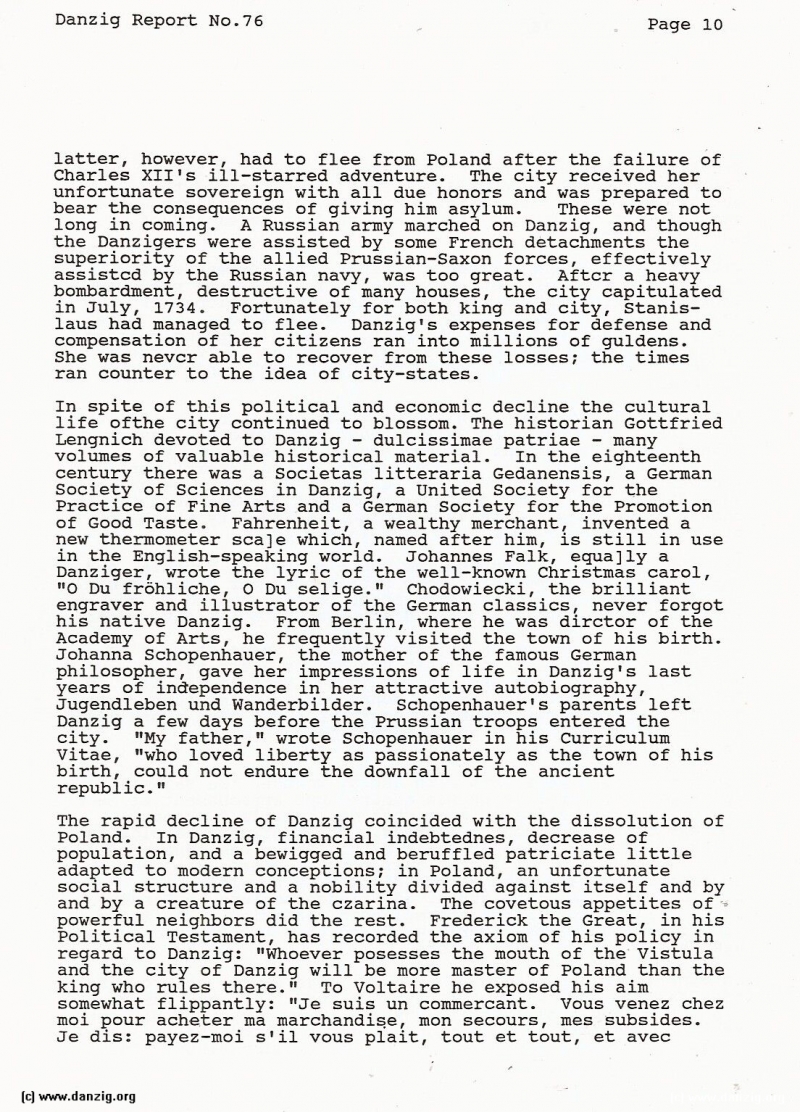
latter, however, had to flee from Poland after the failure of Charles Xli’s ill—starred adventure. The city received her unfortunate sovereign with all due honors and was prepared to bear the consequences of giving him asylum. These were not long in coming. A Russian army marched on Danzig, and though the Danzigers were assisted by some French detachments the superiority of the allied Prussian—Saxon forces, effectively assistcd by the Russian navy, was too great. Aftcr a heavy bombardment, destructive of many houses, the city capitulated in July, 1734. Fortunately for both king and city, Stanisl aus had managed to flee. Danzig’s expenses for defense and compensation of her citizens ran into millions of guldens. She was nevcr able to recover from these losses; the times ran counter to the idea of city—states.
In spite of this political and economic decline the cultural life ofthe city continued to blossom. The historian Gottfried Lengnich devoted to Danzig — dulcissimae patriae — many volumes of valuable historical material. In the eighteenth century there was a Societas litteraria Gedanensis, a German Society of Sciences in Danzig, a United Society for the Practice of Fine Arts and a German Society for the Promotion of Good Taste. Fahrenheit, a wealthy merchant, invented a new thermometer scaje which, named after him, is still in use in the English-speaking world. Johannes Falk, equa]ly a Danziger, wrote the lyric of the well—known Christmas carol, ‘.0 Dii fröhliche, 0 Du selige.” Chodowiecki, the brilliant engraver and illustrator of the German classics, never forgot his native Danzig. From Berlin, where he was dirctor of the Academy of Arts, he frequently visited the town of his birth. Johanna Schopenhauer, the mother of the famous German philosopher, gave her impressions of life in Danzig’s last years of independence in her attractive autobiography, Jugendleben und Wanderbilder. Schopenhauer’s parents left Danzig a few days before the Prussian troops entered the city. “My father,” wrote Schopenhauer in his Curriculum Vitae, “who loved liberty as passionately as the town of his birth, could not endure the downfall of the ancient republic.”
The rapid decline of Danzi coincided with the dissolution of Poland. In Danzig, financial indebtednes, decrease of population, and a bewigged and beruff led patriciate little adapted to modern conceptions; in Poland, an unfortunate social structure and a nobility divided against itself and by and by a creature of the czarina. The covetous appetites of - powerful neighbors did the rest. Frederick the Great, in his Political Testament, has recorded the axiom of his policy in regard to Danzig: “Whoever posesses the mouth of the Vistula and the city of Danzig will be more master of Poland than the king who rules there.” To Voltaire he exposed his aim somewhat flippantly: “Je suis un coitunercant. Vous venez chez mci pour acheter ma marchandise, mon secours, mes subsides. Je dis: payez—moi s’il vous plait, tout et tout, et avec
Danzig Report Vol. 1 - Nr. 76 - July - August - September - 1992, Page 10.
Hits: 3248
Added: 02/07/2015
Copyright: 2025 Danzig.org

